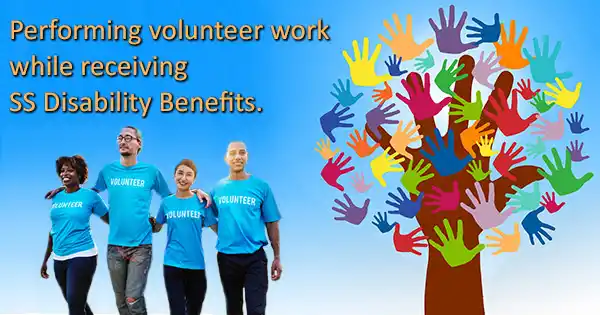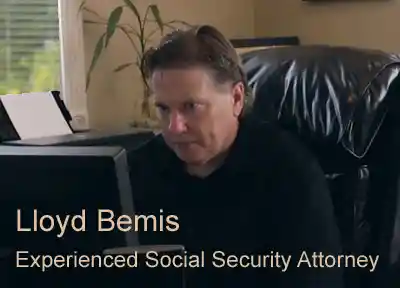Performing Volunteer work while receiving Social Security Disability Benefits.
Can I Lose My Disability Benefits If I Do Volunteer Work?
Author Attorney Lloyd Bemis:
There are many good reasons why a person who is disabled and receiving disability benefits might consider volunteer work. Even though you are unable to work, that doesn’t mean you can’t help your community in some way. Volunteering can make a person who is not working feel like they are making a contribution and have a purpose. Volunteering can also provide much needed social interaction and prevent depression. In short, volunteering can fill gaps in a disabled person’s life.

A person receiving disability benefits must be careful performing work on a volunteer basis as the volunteer job may jeopardize their disability status.
The Social Security Administration, however, may not look favorably on some volunteer work.
A person must be careful about the type of work they perform on a volunteer basis as well as the number of hours they spend or the volunteer job may jeopardize their disability status. The Social Security Administration defines work as performing tasks for pay or profit or doing work that is usually performed for pay or profit – even if no payment is received or no profit is realized. The general standard Social Security uses to determine if an activity constitutes work is Substantial Gainful Activity (SGA) which refers to the mental or physical demands of the work a person performs and the income limit received for that work. In 2024, SGA is $1,550 per month for nonblind persons and $2,590 for blind persons. If you volunteer and receive SSDI, the SSA may decide that volunteer work constitutes SGA, even if you are not paid, and terminate your disability benefits.
Social Security does not have any clear guidelines to distinguish what types of volunteer work are considered SGA, but some circumstances are likely to convince the SSA that a person is capable of working a full-time job:
- Volunteering more than a few hours per week
- Volunteer work that would earn above SGA if the person was paid for the work
- The requirements of the work indicate the person could work at SGA level or return to their previous job
- Volunteering at a business owned by a relative
If you have been denied disability don’t give up! Contact a Disability lawyer at 512-454-4000 for a free consultation and get the benefits you deserve.
It should be noted that tasks a person performs to care for themselves, such as cooking, cleaning, physical therapy or participating in social activities are not considered SGA.
Under the Domestic Volunteer Service Act of 1973, certain programs and organizations that are exceptions to the above standards. If a person volunteers for any of the following programs, their work is never considered SGA:
- Volunteers in Service to America (VISTA)
- University Year for Action
- Special Volunteer Programs
- Retired Senior Voluntary Program
- Foster Grandparent Program
- Service Corps of Retired Executives
- Active Corps of Executives
Also, if a person volunteers for an advisory committee, commission, board, council or other group created by the Federal Advisory Committee Act (FACA), any services performed or payments received are not considered SGA – unless the person serves in a position that was part of their previous employment.
Some volunteer work eventually leads to full-time, paid employment. If you are not planning on staying on disability, you can work at a job for a nine-month trial period earning SGA and still receive disability benefits.
At the end of nine months you may decide to continue working or stop. If you choose to work and later decide you are unable to work, you have eight months to regain disability benefits without reapplying. In either case, you must contact the Social Security as soon as you begin employment.
The Social Security Administration’s Ticket-to-Work Program is a voluntary program for disabled persons ages 18 to 64 and receiving SSDI or SSI.
This program aims to reduce or eliminate dependence on disability benefits and increase financial independence. A beneficiary can receive vocational guidance and get work experience without automatically losing their disability benefits. It also allows a person to continue Medicaid and Medicare benefits during the transition back to work and receive disability benefits again if they have to stop working. For more information see https://choosework.ssa.gov.
Volunteering while receiving disability income can be a tricky business. If you need help deciding whether volunteer work will benefit you or put your disability status at risk, it’s best to consult a qualified disability attorney.
Disability benefits are an important source of income for those who are unable to work. If you are not able to work due to accident or illness, you may be eligible for Social Security Disability or Long Term Disability benefits. If you have applied for benefits and been denied, contact the attorneys at Bemis, Roach and Reed for a free consultation. Call 512-454-4000 and get help NOW.
Filing for Social Security Disability When You Are Self-Employed
What Doctors and Dentists Need to Know About Disability Insurance
Some Illnesses Automatically Qualify for Social Security Disability Benefits

Your Free Initial Consultation
Call now:
At Bemis, Roach and Reed, if we can't help you, we will try to find the right attorneys for you.
We offer each of our prospective clients a free no obligation one hour phone or office consultation to see if we can help you and if you are comfortable with us. We know how difficult a time like this can be and how hard the decisions are. If we can be of assistance to you and help you find a solution to your issue we will even if that means referring you to another attorney.
Let's get you Started:
If you could provide us with some basic information about your claim we will get right back with you with a free case evaluation and schedule your Free Consultation Today.







